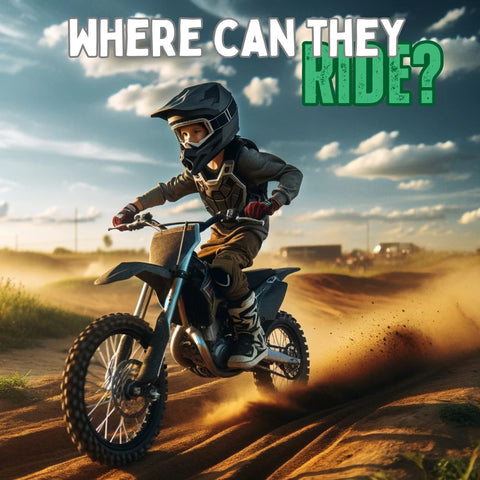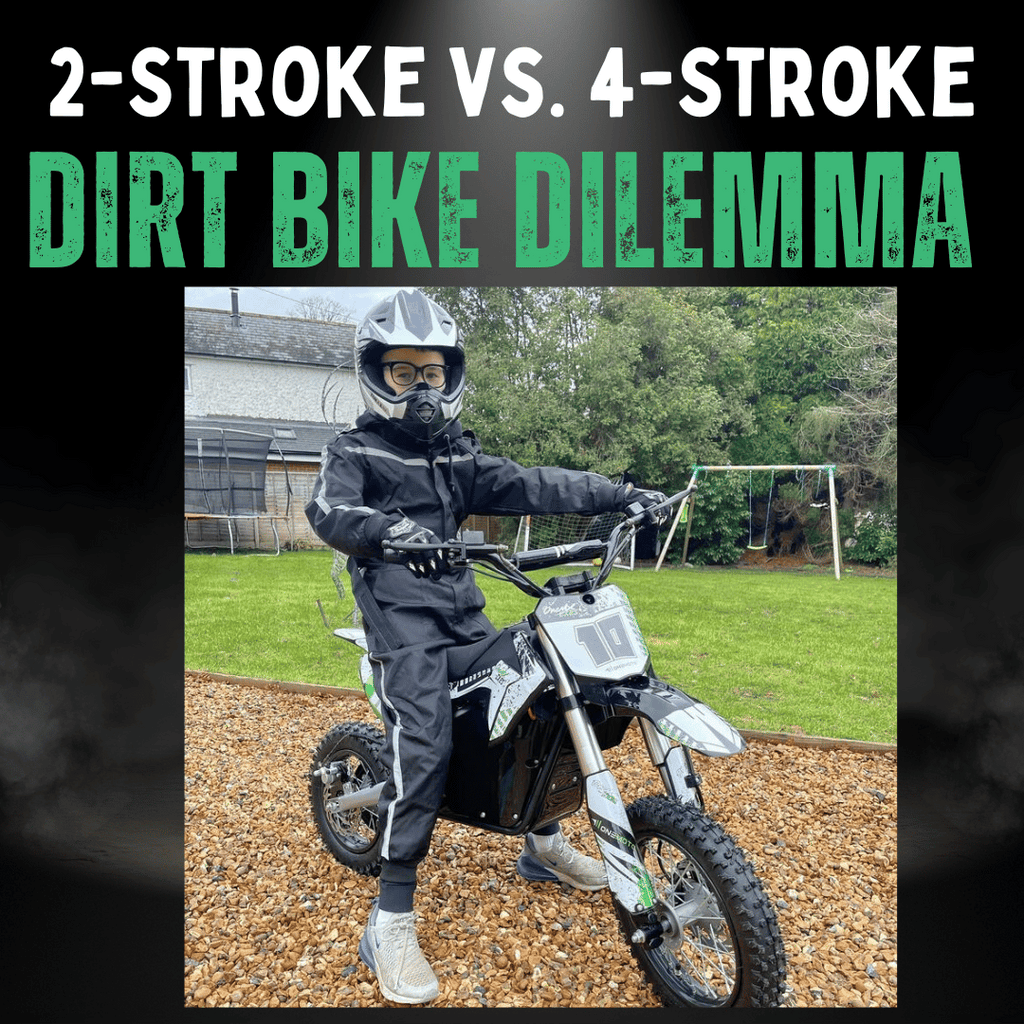
Updated: 16.05.25
Craving adventure and the thrill of the open trail? Dirt biking might be your answer.
Whether you’re a thrill-seeker, an outdoor enthusiast, or a parent eyeing a dirt bike for your adrenaline-loving child, this guide explores the pros, cons, costs, safety considerations, and local regulations to help you decide if it’s the right choice.
1. The Benefits of Owning a Dirt Bike
Excitement and Adventure
Dirt biking delivers an unmatched rush, with the wind in your hair and the trail speeding by. It’s a mental escape from daily stress and a thrilling way to explore the outdoors.
- Stress Relief: Swap the 9-to-5 grind for the freedom of the trail, clearing your mind with every ride.
- Thrill Factor: Control your own roller coaster, navigating twists and turns for an adrenaline boost.
Versatility
Dirt bikes thrive on diverse terrains, making them a gateway to endless adventures.
- Multi-Terrain Fun: Ride on dirt tracks, forest trails, or sandy deserts—the world is your playground.
- Path to More: Start with dirt biking and explore motocross or enduro for new challenges.
Related: Where Can I Take My Kids Dirt Biking?
Social Connections
Dirt biking fosters community and bonding opportunities.
- Community Engagement: Join clubs and groups to connect with fellow riders.
- Family Bonding: Share the excitement with family rides, creating lasting memories.
Physical Fitness
Dirt biking is a fun way to stay active, engaging multiple muscle groups.
- Full-Body Workout: Improve balance, coordination, and reflexes without a gym.
- Active Lifestyle: Turn exercise into an exhilarating hobby.
Related: Dirt Bike Fitness: Physical Training for Riders
Affordability
Dirt biking can fit various budgets with smart choices.
- Used Bikes: Quality second-hand bikes offer fun at a lower cost.
- DIY Maintenance: Learn basic repairs via online tutorials to save money.
Related: Petrol or Electric? Which Dirt Bike is Better for You?
2. The Challenges of Owning a Dirt Bike
Safety Concerns
Safety is critical in dirt biking, requiring proper gear and training.
- Essential Gear: Invest in helmets, knee pads, and gloves for protection.
- Training: Take lessons to master safe riding techniques.
Related: What Safety Gear Do Dirt Bike Riders Need?
Financial Costs
Beyond the bike, additional expenses can add up.
- Hidden Costs: Factor in repairs, gear, insurance, and transport. Transporting your bike to trails may require a trailer or truck, adding to initial and ongoing costs.
- Budget Planning: Set a realistic budget to avoid surprises.
Cost Comparison
| Item | Cost (£) | Details |
|---|---|---|
| New Dirt Bike | 1,000–10,000 | Varies by brand and model |
| Used Dirt Bike | 500–5,000 | Depends on condition |
| Safety Gear | 200–1,000 | Includes helmet, gloves, pads |
| Maintenance | 100–500/year | Routine checks and repairs |
| Insurance | 100–400/year | Varies by provider |
Related: Cheap Dirt Bike Tips Dealers Won’t Tell You
Noise and Disruption
Dirt bikes can be loud, which may cause issues in some areas.
- Noise Regulations: Check local restrictions to avoid fines.
- Community Consideration: Be mindful of neighbors to maintain good relations.
Time Commitment
Dirt biking requires dedication.
- Time Investment: Maintenance, travel, and rides can consume weekends.
- Balancing Act: Weigh the time commitment against the sport’s rewards.
3. Choosing the Right Dirt Bike
Selecting the perfect dirt bike is crucial for a safe and enjoyable experience. Talk to experienced riders or join local clubs to get advice on bike selection, gear, and riding tips tailored to your goals. Consider these factors:
Skill Level
- Beginners: Choose low-power bikes for easier handling. Off-road trails provide a safe, traffic-free space to build confidence and master riding basics.
- Intermediate Riders: Opt for bikes with moderate power to match growing skills.
- Pros: Select high-performance bikes for advanced challenges.
Terrain Type
- Motocross: Pick lightweight, high-performance bikes for tracks.
- Trail Riding: Choose durable bikes for varied terrains.
- Desert Riding: Select models designed for sand and heat.
- Casual Riding: Opt for versatile, user-friendly bikes for leisurely rides on local trails.
Physical Fit
- Height: Ensure feet touch the ground when seated.
- Weight: Pick a bike you can handle comfortably.
Budget and Brands
- Price: Include gear and upgrades in your budget.
- Brands: Research reputable brands for reliability.
Local Regulations
Before buying, check with local authorities to ensure dirt biking is permitted in your area. Some regions require permits or restrict riding to designated trails, so verify regulations to avoid fines and ride legally.
| Bike Type | Price Range (£) | Best For | Features |
|---|---|---|---|
| Beginner Bikes | 500–2,000 | New Riders | Low power, easy handling |
| Intermediate Bikes | 2,000–5,000 | Experienced Riders | Moderate power, enhanced features |
| Advanced Bikes | 5,000–10,000+ | Professional Riders | High power, advanced features |
| Trail Bikes | 1,500–5,000 | Off-Road Enthusiasts | Durable, versatile |
| Motocross Bikes | 3,000–8,000 | Motocross Racers | High performance, lightweight |
Related: 2 Stroke vs 4 Stroke Dirt Bike: Which One Fits Your Ride?
4. Dirt Biking for Kids
Dirt biking can be a rewarding family activity, fostering confidence and responsibility in children.
Age and Maturity
- Physical Age: Younger kids may struggle with even small bikes; start with age-appropriate models.
- Emotional Maturity: Cautious or resilient kids may adapt better to learning.
Bike Sizes for Kids
- 50cc–70cc: Ideal for beginners, offering manageable power.
- 70cc–110cc: Suitable for older kids ready for more challenges.
Related: What Size Dirt Bike Do You Need?
Safety First
- Child-Specific Gear: Helmets and pads boost safety and confidence.
- Training: Lessons teach safe riding and build skills.
Family Involvement
- Quality Time: Ride together for fun and bonding.
- Responsibility: Teach kids bike maintenance for life lessons.
5. Health and Emotional Benefits
Physical Fitness
Dirt biking is a full-body workout, boosting cardiovascular health and core strength.
- Cardio: Riding elevates heart rate for a healthy workout.
- Muscle Building: Turns and jumps engage core and leg muscles.
Related: The Physical Perks of Off-Roading for Your Kids
Emotional Rewards
Dirt biking enhances mental well-being and confidence.
- Stress Relief: Trails offer an escape from daily pressures.
- Confidence Building: Mastering maneuvers boosts self-assurance.
6. Dirt Biking as an Outdoor Adventure
For outdoor enthusiasts, dirt biking offers a unique way to explore nature.
- Versatile Exploration: Navigate trails, deserts, or forests for varied adventures.
- Wilderness Connection: Discover new landscapes with every ride.
Summary
Buying a dirt bike is a personal decision balancing thrill, cost, and commitment. The excitement, fitness benefits, and community make it appealing, but safety, expenses, time investment, and local regulations require careful consideration. Whether for you or your kids, choose a bike that fits your skill, terrain, and budget. Ready to kick up some dirt? Explore RiiRoo’s dirt bikes and hit the trails!
Get in Touch 🚀
Loved our guide on buying a dirt bike? Find more tips at RiiRoo.com.
Have questions about kids’ dirt bikes? Try our Live Chat or browse our motorbike collection!
Frequently Asked Questions
What are the main costs of owning a dirt bike?
Costs include the bike (£500–10,000), safety gear (£200–1,000), maintenance (£100–500/year), insurance (£100–400/year), and travel or event fees.
Is dirt biking safe for kids?
With proper gear, training, and age-appropriate bikes (e.g., 50cc for young kids), dirt biking is safe. Always supervise and consult experts.
How do I choose the right dirt bike size?
Match engine capacity to age and skill: 50cc (3–6 years), 80–110cc (8–10 years), 125–250cc (teens), 125–500cc (adults). Ensure feet touch the ground.
Should I buy a new or used dirt bike?
Used bikes (£500–5,000) suit beginners, saving money for gear. New bikes (£1,000–10,000) offer warranties and reliability for serious riders.
Where can I find quality dirt bike accessories?
Explore RiiRoo’s accessories for helmets, pads, and more to enhance your ride.










Share:
7 UNMISSABLE Tips to Clean Your Dirt Bike Chain Like a PRO
Dirt Bike vs ATV: 20 Pros and Cons of Each Sport